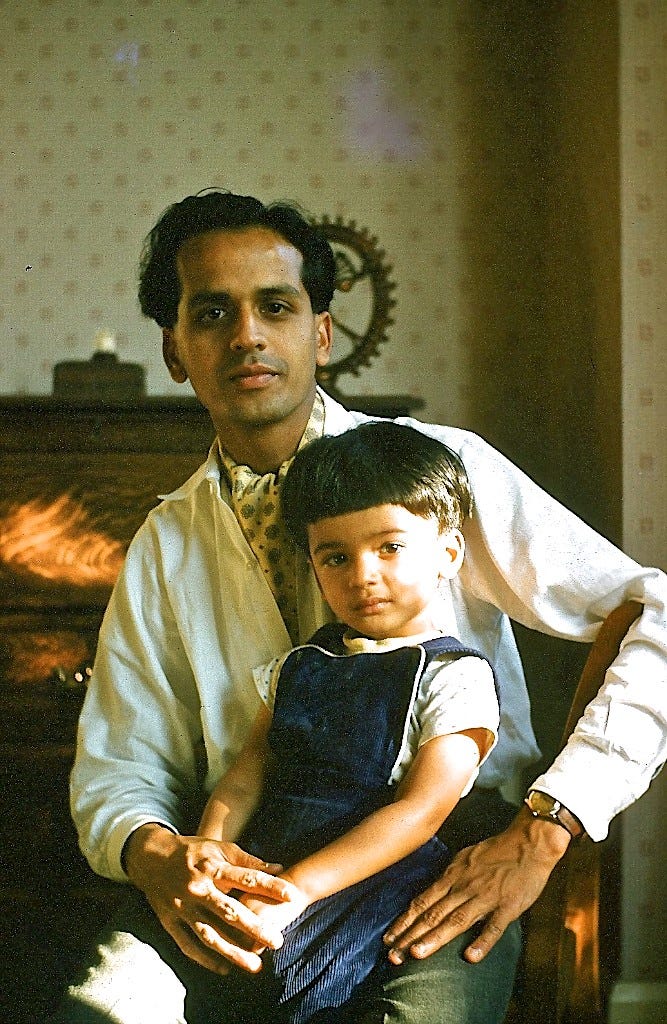
I first met Pico Iyer nearly 20 years ago, when I was producing documentaries about great books for the NEA, and he agreed to be interviewed. As evidence of his eloquence, here’s something he rattled off in our conversation about Ursula K. Le Guin’s A Wizard of Earthsea:
The book has for me the silver light of the Pacific Northwest where Ursula Le Guin lives, and I feel that I'm almost looking out on the sharp and steely maritime skies that you see in places like Portland and Seattle. But the fabric of it is very Eastern and, in that sense, very ancient.
That’s just Pico in casual conversation.
He and I collaborated on other projects over the years—he wrote for a literature and rock-and-roll magazine I used to edit, Radio Silence, and he curated a shelf of books for my bar in Oakland. And here I’ve come begging at his doorstep once again in asking him to contribute a piece to Hey Pop. Now that I’m listing all the generosities he has sent my way over the years, I wish he’d ask me over to mow his lawn or wash his car, to polish his silverware or cook him dinner. I’ll do anything.
Pico Iyer is certifiably the Nicest Man Alive. Any occasion in which I’ve been fortunate enough to cross his path has inspired me to look inward and promise myself that I’ll be more present, thoughtful, and compassionate. I’ve learned so much from him, even from—or especially from—the briefest and simplest exchanges.
He has written broadly and brilliantly about traveling the globe as well as staying put, about figures as disparate (and similar) as Leonard Cohen and the Dalai Lama. Every couple of years, I reread The Art Of Stillness, Pico’s perfect slim volume about the importance of unplugging and the gifts of silence. He has written 16 books to date, which have been translated into 23 languages, most recently The Half Known Life: In Search of Paradise. I interviewed him onstage for City Arts & Lectures in 2019, on the occasion of his publishing a pair of remarkable books about his adopted country—A Beginner’s Guide to Japan and Autumn Light. (You can listen to that conversation on Apple Podcasts here.)
In today’s piece, Pico offers a deeply personal reflection on his father, Raghavan N. Iyer, who, at a startlingly young age, became one of the most admired orators and thinkers of his time and went on to have a long and celebrated career.
-DS

A Riddle Beyond Reckoning
by Pico Iyer
The deepest gift my father passed on to me was a sense of mystery; I could never figure him out. Nor even discern how much he, lifelong master of confidence, could figure himself out. He bestowed on me the most priceless of lessons: All of us, alone and together, remain riddles beyond the reach of reckoning.
My father radiated such effortless charisma that I was determined to move in the opposite direction, when it came to temperament and calling and even lifestyle; I determined, at a very young age, that I would craft my own destiny, down to the last letter. But as the years propel me through my autumn, I register the way I organize my books in tidy piles all around me. Him to the last degree. The way I read in every direction, and very fast, with glee. The way my feet stick up when I’m lying flat-out. Not many years ago, I caught sight of an inscription my father had written in a friend’s book and I couldn’t help but shudder: the fast black scribble, the tiny letters, the length of the message, the almost suspect fluency—it was all me to a T (or I was it).
The mystery of inheritance and of where exactly we come from; the mystery of how my father, growing up in a two-room suburban flat far from privilege, became the lone Rhodes Scholar among 600 million very bright and competitive Indians in his year, able to speak for hours (on Shakespeare, Plato, Perry Mason, or the C.I.A.) without notes. A professor by the age of eighteen, though none of his six siblings, nor his parents, belonged to the academic world.
For me he was an absent figure, on the map, but always present in some deeper way; and the more he gleamed and spoke, the more he danced across the room, the farther he was from being grasped.
I dance around the room myself these days, singing nonsense verses just the way he used to do: I seem to have become precisely what I spent years rebelling against. My wife of thirty-five years never met my father, but I assure her that she’s keeping him company every hour of the day. Perhaps the years have opened up to me the folly of running from one’s blood.
Just before my mother turned eighty, a friend of hers suggested I interview her for a few minutes at a birthday party. Against my better instincts, I said yes. At the end of our public conversation, I asked her what surprising lesson she had most profoundly absorbed in her eight decades on our planet.
“You can never know another person,” she replied without a moment’s hesitation.
I hadn’t expected such an answer from my mother; clearly, I didn’t know her well enough. And when I reflected, season after season, upon her answer, I realized she might have been thinking explicitly of her husband of forty years, or even of her son. As a boy, I had such a yearning to know it all; now, as I near the coming of winter, I bow in gratitude before the fact that I can barely know a thing.


Below, listen to Pico read this piece. Thank you for supporting Hey Pop.





